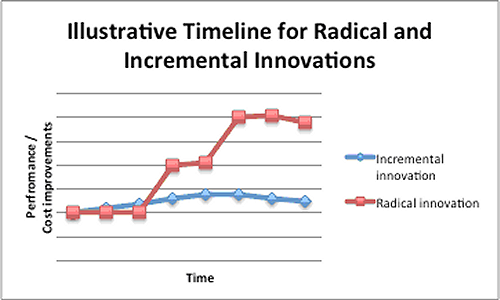Innovation Hubs in Local Enterprise Partnerships: How to encourage innovation in collaboration with local businesses

In June 2010, the Government invited local business and civic leaders to come forward with proposals for establishing LEPs that reflected natural economic geographies. The Government announced the approval of 24 Local Enterprise Partnerships (LEPs) in the Local Growth White Paper on 28 October 2010. A further 15 LEPs, including one covering the whole of London, has taken the total to 39. All areas of England are now covered by an LEP.
Lord Heseltine’s Oct 2012 report, ‘No Stones Unturned’ recommended to empower LEPs to lead local economic development through a major devolution of funding. The report pointed out that involvement of local business people in the governance of their communities has dwindled, and their energy and innovation has been lost. He concluded that local economic leadership that drove the UK to the forefront of the world economy has disappeared.
In this Bow Briefing, we explore the role of innovation in LEPs to create radical economic, cost and service improvements. To achieve this, we propose a pilot scheme to create innovation hubs in partnership with local Small to Medium sized Enterprises (SMEs) and other community organisations. Innovations come in many forms – they can be small or specific, a service, process or a whole system – or they can be an entirely new or borrowed product. Any framework must aim to unlock creative potential. This Bow Briefing explains how to develop a strategic framework to achieve radical innovation.
Many, usually mature commercial organisations design specific structures and processes to support and manage different types of innovation. A proven feature for some is the use of innovation and design hubs – small units with flexible resources sometimes in collaboration with external stakeholders to test, develop, and implement radically new ideas.
Our proposal borrows this concept and is similar to the ‘skunk works’ as used by Lockheed Martin during the Second World War. Skunk works projects were developed by a small and loosely structured group of people who researched and cultivated a project primarily to create radical innovation. Our objective is to radically redesign service delivery to citizens and create innovative products and services. Significant benefits only arise when things are genuinely done differently as illustrated in the graph below.

The Bow Group Proposals: Operating Principles
We propose four stages of creation and delivery of innovation hubs as follows:

1. Identifying areas of concern – the need for innovation and issues to be solved
We propose that each LEP decides on the issues and needs for resolution at each innovation hub. Outlined below are two topical issues requiring radical solutions but deemed to high in risk by the local community:

Each hub would receive a budget of £500k and we propose the Department for Communities
and Local Government take the lead in allocating funds with a total budget of £500k.
Idea generation – membership of the hub
Each LEP would be encouraged to create one or more innovation hub on a trial basis. The hub would be promoted as a centre of excellence where selected civil servants who work locally in front-line departments would be seconded with full pay for a period of time, generally no less than a year. Invitations would be also sent to local enterprise initiatives and businesses to participate on a voluntary basis. The membership would be restricted to a maximum of 15 people evenly selected from the civil service and business communities. The 15th member would be a facilitator appointed from an appropriate consultancy firm (ideally not one of the larger firms). The facilitator’s role is critical, encouraging and facilitating free thinking to radically change existing services. His or her firm would be paid a modest fee for their services. The facilitator, in partnership with the Chair of the LEP, would also be given the mandate to select SMEs and other organisations most relevant to the project in hand.
The hub would be located in an independent location away from the day-to-day activities of the Local Government Organisations. The Board of the LEP will assure operational independence of each hub so that they can be free to develop radical innovative ideas and projects.
2. Opportunity recognition and evaluation
The facilitator’s role is to encourage can-do idea generation. Various commercial techniques are available to systematically facilitate opportunity recognition and narrow down ideas. Nevertheless, we believe that an unstructured approach is far better than rigid commercial techniques during these brainstorming stages. This fosters thinking outside the box and will be the main aim of the facilitator.
3. Development
Each hub would create an innovation register of no more than five projects, which they believe could radically change the service offering and achieve significant cost savings or economic benefits. Each project in the innovation register would undertake preliminary financial modelling such as break-even analysis and discounted cash flow (time value of money techniques to assess the feasibility of an idea before launch). The hub could seek external help from a local business (an accountancy practice), if the skill and specialism is not available within the membership of the hub. A modest fee would be paid for this service. Modelling assumptions would be clearly documented for further challenge prior to commercialisation stage.
4. Commercialisation – Dragons’ Den
We propose that all innovation hubs decide their best project and present to a ‘Dragons’ Den’ panel comprising of Secretary of State for Communities and Local Government, three Chairs of LEPs selected nationally and three Private Equity Investors. One idea is for this ‘event’ to be televised in order to recoup the initial cost of the pilot and public opinion could also be sought from a Twitter or similar poll.
Each Dragon will be given a budget of up to £10m to invest in the best innovation project so that a detailed assessment can be done and execute the best idea. Two dragons (a cabinet minister and a private equity investor) will act as the chief sponsors during the feasibility and implementation phases to assist in overcoming technical and financial hurdles during prototype, testing or launch. Each member of the winning hub would be given an award. A follow-up televised programme could be also arranged to see the status of the execution of the project and cost and performance improvements.
Reproduced and adapted with kind permission of the Bow Group
